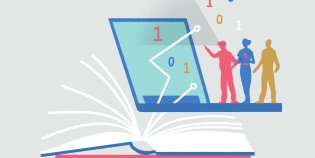In the Research Agenda, we identify 8 topics that the KB will focus on over the next 4 years. We intend to maintain a dialogue about these themes with our partners from academia, public libraries, national heritage organisations and the business community. This will enable us to expand our knowledge of the topics and convert it into workable solutions. The digital transformation in which we find ourselves as an organisation is leading to changes. The Research Agenda helps us to make well-founded (policy) decisions and to put topics and issues on the agenda that will affect the KB in the long and medium term.
What's in the Research Agenda?
The Research Agenda is a dynamic document, updated on the basis of findings and new developments. The topics of the Research Agenda 2023-2026 are:
Topic: Online Public Space
How do we contribute towards safeguarding online public spaces? We are facing increasingly pressing issues, for example around how to set up an online public space, how to deal with information overload and disinformation, how to ensure privacy and security, and our changing news consumption.
Topic: AI and Ethics
How can we use existing and new applications of artificial intelligence in an ethical way? How should we position ourselves in collaborating with parties that use artificial intelligence for public applications, such as recommendation systems? How do we ensure that we are working according to our AI principles when managing and (re)using our collections and when developing software? We are working towards a situation in which we can test new initiatives with a machine-learning component against this.
Topic: Searching for Collections and Data
How can we make our digital and physical collections discoverable and searchable in new ways? New technologies from the areas of the semantic web, knowledge representation and artificial intelligence offer more and more opportunities to make our collections discoverable and usable in new ways. At the same time, we must also bear in mind developments in copyright, intellectual property, open access and sustainable accessibility.
Topic: Quality of Digital Content
How do we define and measure the quality of our digital content? In practice, defining and measuring quality is already proving to be something many organisations struggle with. We intend to investigate how we can select and improve certain subcollections whose quality appears to be insufficient for certain applications. Research into quality will also be needed in the future around born-digital material: with changing standards and applications, there will be a need to define and measure quality there too, possibly followed by improvement processes (functional preservation).
Read more about what we are doing in the areas of digital preservation.
Topic: Automatic Metadata Tagging
How do we create automatic metadata to describe content in a smarter and richer way? Thanks to artificial intelligence, such as language technology and image recognition, computers are increasingly able to interpret texts. For example, they can recognise the characters and genre of a publication and add them to the metadata for that publication. We are still describing many titles manually at the moment. We are exploring ways in which computers can support this work, for example with AI. We are also looking at opportunities of automatically generating metadata to enrich texts with information that we do not currently add, for example information about the reading level.
Topic: Digital Accessibility
How can we make our digital services suitable for as many users as possible? Developments in digital content mean that we don't have to create separate forms of publication for different users. In order to comply with the Legislation of June 2025, the KB services will be adapted. The new digital accessibility research group is identifying what is needed for this.
Topic: Conservation
How can we use new and existing research techniques regarding materiality and preservation to conserve physical collections and make them more accessible?
Conservation research has developed considerably in recent decades and has become an important part of the cultural heritage sector. Research techniques are in full development and non-destructive testing of movable heritage is becoming increasingly sophisticated. Conservation research is constantly evolving, telling us how objects were created and revealing what is invisible to the naked eye. For example, it shows how materials age and what we can do to slow down that process.
Topic: Sustainable Development Goals
What will it take to embrace the sustainable development goals? In 2015, the United Nations set out humanity's to-do list in the form of global sustainable development goals. These goals are intended to put an end to extreme poverty, inequality, injustice and climate change. Libraries saw from the start they were able to contribute towards these goals. In this research group, we aim to explore what public institutions can do in the area of sustainable development goals.




